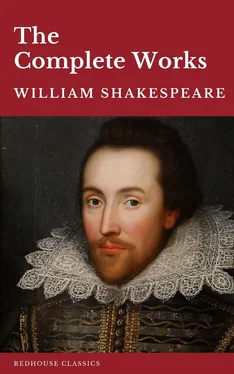To parley with the sole inheritor
Of all perfections that a man may owe,
Matchless Navarre; the plea of no less weight
Than Aquitaine, a dowry for a queen.
Be now as prodigal of all dear grace
As Nature was in making graces dear,
When she did starve the general world beside
And prodigally gave them all to you.
Prin.
Good Lord Boyet, my beauty, though but mean,
Needs not the painted flourish of your praise:
Beauty is bought by judgment of the eye,
Not utt’red by base sale of chapmen’s tongues.
I am less proud to hear you tell my worth
Than you much willing to be counted wise
In spending your wit in the praise of mine.
But now to task the tasker: good Boyet,
You are not ignorant all-telling fame
Doth noise abroad Navarre hath made a vow,
Till painful study shall outwear three years,
No woman may approach his silent court;
Therefore to ’s seemeth it a needful course,
Before we enter his forbidden gates,
To know his pleasure; and in that behalf,
Bold of your worthiness, we single you
As our best-moving fair solicitor.
Tell him, the daughter of the King of France,
On serious business craving quick dispatch,
[Importunes] personal conference with his Grace.
Haste, signify so much, while we attend,
Like humble[-visag’d] suitors, his high will.
Boyet.
Proud of employment, willingly I go.
Exit Boyet.
Prin.
All pride is willing pride, and yours is so.
Who are the votaries, my loving lords,
That are vow-fellows with this virtuous Duke?
[1.] Lord.
[Lord] Longaville is one.
Prin.
Know you the man?
[Mar.]
I know him, madam; at a marriage-feast,
Between Lord Perigort and the beauteous heir
Of Jaques Falconbridge, solemnized
In Normandy, saw I this Longaville,
A man of sovereign [parts, peerless] esteem’d,
Well fitted in arts, glorious in arms;
Nothing becomes him ill that he would well.
The only soil of his fair virtue’s gloss,
If virtue’s gloss will stain with any soil,
Is a sharp wit match’d with too blunt a will,
Whose edge hath power to cut, whose will still wills
It should none spare that come within his power.
Prin.
Some merry mocking lord belike, is’t so?
[Mar.]
They say so most that most his humors know.
Prin.
Such short-liv’d wits do wither as they grow.
Who are the rest?
[Kath.]
The young Dumaine, a well-accomplish’d youth,
Of all that virtue love for virtue loved;
Most power to do most harm, least knowing ill;
For he hath wit to make an ill shape good,
And shape to win grace though he had no wit.
I saw him at the Duke Alanson’s once,
And much too little of that good I saw
Is my report to his great worthiness.
[Ros.]
Another of these students at that time
Was there with him, if I have heard a truth.
Berowne they call him, but a merrier man,
Within the limit of becoming mirth,
I never spent an hour’s talk withal.
His eye begets occasion for his wit,
For every object that the one doth catch
The other turns to a mirth-moving jest,
Which his fair tongue, conceit’s expositor,
Delivers in such apt and gracious words
That aged ears play truant at his tales,
And younger hearings are quite ravished,
So sweet and voluble is his discourse.
Prin.
God bless my ladies! are they all in love,
That every one her own hath garnished
With such bedecking ornaments of praise?
[1.] Lord.
Here comes Boyet.
Enter Boyet.
Prin.
Now, what admittance, lord?
Boyet.
Navarre had notice of your fair approach,
And he and his competitors in oath
Were all address’d to meet you, gentle lady,
Before I came. Marry, thus much I have learnt:
He rather means to lodge you in the field,
Like one that comes here to besiege his court,
Than seek a dispensation for his oath,
To let you enter his [unpeopled] house.
Enter [Ferdinand, King of] Navarre, Longaville, Dumaine, and Berowne, [and Attendants].
Here comes Navarre.
[The ladies-in-waiting mask.]
King.
Fair Princess, welcome to the court of Navarre.
Prin. “Fair” I give you back again, and “welcome” I have not yet. The roof of this court is too high to be yours, and welcome to the wide fields too base to be mine.
King.
You shall be welcome, madam, to my court.
Prin.
I will be welcome then—conduct me thither.
King.
Hear me, dear lady: I have sworn an oath.
Prin.
Our Lady help my lord! he’ll be forsworn.
King.
Not for the world, fair madam, by my will.
Prin.
Why, will shall break it, will, and nothing else.
King.
Your ladyship is ignorant what it is.
Prin.
Were my lord so, his ignorance were wise,
Where now his knowledge must prove ignorance.
I hear your Grace hath sworn out house-keeping:
’Tis deadly sin to keep that oath, my lord,
And sin to break it.
But pardon me, I am too sudden bold;
To teach a teacher ill beseemeth me.
Vouchsafe to read the purpose of my coming,
And suddenly resolve me in my suit.
[Giving a paper.]
King.
Madam, I will, if suddenly I may.
Prin.
You will the sooner, that I were away,
For you’ll prove perjur’d if you make me stay.
Ber.
Did not I dance with you in Brabant once?
Kath.
Did not I dance with you in Brabant once?
Ber.
I know you did.
Kath.
How needless was it then
To ask the question?
Ber.
You must not be so quick.
Kath.
’Tis long of you that spur me with such questions.
Ber.
Your wit’s too hot, it speeds too fast, ’twill tire.
Kath.
Not till it leave the rider in the mire.
Ber.
What time a’ day?
Kath.
The hour that fools should ask.
Ber.
Now fair befall your mask!
Kath.
Fair fall the face it covers!
Ber.
And send you many lovers!
Kath.
Amen, so you be none.
Ber.
Nay then will I be gone.
King.
Madam, your father here doth intimate
The payment of a hundred thousand crowns,
Being but the one half of an entire sum
Disbursed by my father in his wars.
But say that he, or we, as neither have,
Receiv’d that sum, yet there remains unpaid
A hundred thousand more, in surety of the which
One part of Aquitaine is bound to us,
Although not valued to the money’s worth.
If then the King your father will restore
But that one half which is unsatisfied,
We will give up our right in Aquitaine,
And hold fair friendship with his Majesty.
But that, it seems, he little purposeth:
For here he doth demand to have repaid
A hundred thousand crowns, and not demands,
[On] payment of a hundred thousand crowns,
To have his title live in Aquitaine;
Which we much rather had depart withal,
And have the money by our father lent,
Than Aquitaine, so gelded as it is.
Dear Princess, were not his requests so far
From reason’s yielding, your fair self should make
Читать дальше












